#gov. Kim Reynolds
Text
The COVID pandemic provided a real-time experiment of a strengthened social safety net, in which several anti-poverty programs were bolstered and benefits increased. One such program, called Pandemic EBT, provided a voucher for families to purchase groceries while children were unable to attend school in person, helping them to obtain the nutrition they would otherwise get through free school meals and lifting millions of children out of hunger.
In late 2022, Congress approved a similar, permanent program on a bipartisan basis. Called SUN Bucks, or Summer EBT, the program begins this month and provides families with $40 per child per month in grocery benefits over the summer, or $120 in total, when they don’t have access to free lunches at school.
Thirty-seven states, five territories, and the District of Columbia will participate in the program. But 13 states, all led by Republican governors, have opted out of the program, depriving millions of low-income kids. Several of these states have also declined to expand Medicaid, increasing the burden on households too poor to afford health care or basic groceries.
SUN Bucks isn’t as generous as its pandemic-era iteration, but the Department of Agriculture nonetheless estimates that the program will reach more than 20 million children. “We always see summer as one of the hungriest times of year,” said Kelsey Boone, the senior child nutrition policy analyst at the Food Research and Action Center. “We see summer EBT as kind of filling that gap in the summer nutrition programs that only reach a fraction of the children that participate in reduced-price school meals during the school year.”
The baker’s dozen of red states that opted out are Alabama, Alaska, Florida, Georgia, Idaho, Iowa, Oklahoma, Mississippi, South Carolina, South Dakota, Texas, Utah, and Wyoming. Their governors have cited an array of reasons, including logistical difficulties, but much of the opposition appears patently ideological.
“An EBT card does nothing to promote nutrition at a time when childhood obesity has become an epidemic,” said Iowa Governor Kim Reynolds in December, referring to the debit-like card that food stamp recipients use to purchase groceries. A Florida state official told WFSU News that “we anticipate that our state’s full approach to serving children will continue to be successful this year without any additional federal programs that inherently always come with some federal strings attached.”
A spokesperson for Mississippi Governor Tate Reeves insisted that Summer EBT amounted to “attempts to expand the welfare state,” adding that if “Democrats in Washington had their way, Americans would still be locked down, subjected to Covid vaccine and mask mandates, and welfare rolls would’ve exploded.” (Nebraska Governor Jim Pillen, who initially said his state would not participate because he did not “believe in welfare,” reversed course in February after speaking to low-income children.)
Some governors cited the cost of Summer EBT as prohibitive; a spokesperson for South Dakota Governor Kristi Noem said in January that “federal money often comes with strings attached, and more of it is often not a good thing.” The federal government will cover the cost of the program, but states must provide the funds for half of the operational costs. Others argued that it is redundant, pointing to state summer meal programs. Oklahoma Governor Kevin Stitt rejected the $60 million in federal funding, saying he was “satisfied that kids won’t be going hungry in the summertime.” (He told KJRH News in January, “We gave over $20 million over the last couple of years to different food banks.”)
But Chris Bernard, the president and CEO of Hunger Free Oklahoma, noted that only 6% of eligible children in the state participate in summer meal programs. Moreover, he argued, the existing summer food programs administered by the state are insufficient on their own. “These programs are meant to complement each other, not be exclusive,” Bernard said.
Even though Stitt opted out of Summer EBT, several Native tribes in the state will be participating and will provide the benefits to Native and non-Native children living in tribal territories. As much of the state is composed of tribal lands, this means that a large portion of Oklahoma’s population of low-income children will be served. However, this will also result in piecemeal application of the benefits across the state. Children living in Oklahoma’s second-largest city, Tulsa, will be eligible to receive the benefits through the Muscogee Nation, but families in the state’s largest metropolitan area, Oklahoma City, will not be able to obtain Summer EBT.
“You could be in a school district that’s bordering one of these other territories but not in it, and you’re going to miss out. But even your sibling could attend the other school district, and they’ll get the benefit,” Bernard said. “It makes for confusion. It makes for an unnecessary absence of resources for families.”
Neighboring Texas, the second-largest state in the country, with 3.8 million children eligible for the program, also opted out of Summer EBT; however, the reasoning seemed more logistical than political. Texas’s Health and Human Services Commission argued that it was given insufficient time by the U.S. Department of Agriculture to get the program up and running. Moreover, the state is currently busy unenrolling people from Medicaid after the federal government removed its pandemic-era requirements for continuous coverage.
As a result, the charitable sector may bear much of the brunt of keeping low-income families fed over the summer. For example, the Houston Food Bank operates a summer meal program at around 200 sites in the Houston area, but it’s expensive to administer and reaches a relatively low percentage of children who need it.
“For years, we’ve argued that, yes, we’re happy to do this, but we do not think this is the best solution. The best solution is for those families just to be able to buy the food they need less expensively at supermarkets,” said Brian Greene, the organization’s president and CEO. He added that food banks are “not meeting the need to begin with,” so having to help even more families with children will further strain the charitable sector—not to mention low-income Texans themselves.
“We’ll keep doing as best we can, and it won’t be enough by a large margin. But it’s the families who are going to be taking the hit,” Greene said.
Still, even if a state doesn’t opt into Summer EBT this year, it does not preclude them from doing so in 2025. Stitt has not ruled out participating in the future, and states like Texas that dealt with administrative burdens may find those issues resolved in time for next year.
Something similar occurred with the Affordable Care Act’s Medicaid expansion, the cost of which is largely borne by the federal government. Many Democratic-led states adopted the expansion in 2014, while many red states refused it, even as research demonstrated the expansion’s health and fiscal benefits. Since 2019, six more Republican-led states have joined the club. Seven of the remaining 10 holdouts have also rejected SUN Bucks.
#us politics#news#the new republic#2024#republicans#conservatives#gop#Pandemic EBT#SUN Bucks#Summer EBT#welfare#medicaid#gov. Kim Reynolds#iowa#Mississippi#gov. Tate Reeves#gov. Jim Pillen#Nebraska#gov. Kristi Noem#south dakota#gov. Kevin Stitt#oklahoma#texas#gov. greg Abbott
14 notes
·
View notes
Text
Families with trans kids wonder whether Iowa is safe place for them | Iowa Public Radio
2 notes
·
View notes
Text
Summer tractor shows!
I get the comment a lot, “Are you ever home?” The answer is yes, and no! Yes, I spend a lot of time going, and I spend a lot of time writing about the exciting places (exciting to us that is) that we have been. It is fun to relive our summer tractor show travels as I write about them, research them, and share them. Sometimes, it is almost like traveling twice!
The fourth of July has already come…
#100 years of farmall#100th anniversary of the farmall regular#2024 Red Power Round Up#70th anniversary of the 5 millionth tractor#Abraham Lincoln#Allis Chalmers#Carl Davis#Carlinville#Chad Carpenter#Clay County Fairgounds#collectors#D17#daily parades#Darst family#Dave Berbaum#Don Nowak#donations#Doug Hbrej#Ed Sohn#flooding#fourth of July#Gov. Kim Reynolds#Historic days#IH winter show#IHCC#Iowa Chapter 5#J.I. Case#Kenny Reichert#Ladage Tractor Drive#Larry Boblitt
0 notes
Photo
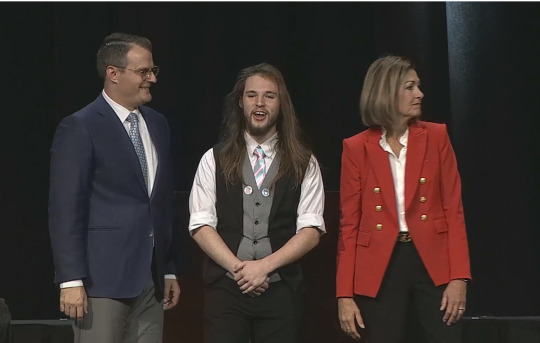
Trans Teen Receiving Award from Iowa Gov. Shouts “Trans Rights Are Human Rights”
A transgender student in Iowa used an award ceremony as an opportunity to protest Gov. Kim Reynolds (R), who earlier this year signed two bills into law that attack trans kids across the state.
[ID: Transgender high school senior Clementine Springsteen stands onstage between Lt. Gov. Adam Gregg (R) and Gov. Kim Reynolds (R) during the Iowa Governor's Scholar awards on April 30, 2023. Clementine Springsteen wears a striped tie with pink, white and blue, symbolizing the colors of transgender pride, with two pins that read “Trans Rights are Human Rights” and “She Her.” ]
#clementine springsteen#trans rights are human rights#trans lives matter#queer#lgbt#lgbtq#lgbqti#protest#activism#iowa#republican#republicans#christian nationalism#lt gov adam gregg#gov kim reynolds#anti trans legislation#2023
13 notes
·
View notes
Text
The governor was firm: Nebraska would reject the new federal money for summer meals. The state already fed a small number of children when schools closed. He would not sign on to a program to provide all families that received free or cut-rate school meals with cards to buy groceries during the summer.
“I don’t believe in welfare,” the governor, Jim Pillen, a Republican, said in December.
A group of low-income youths, in a face-to-face meeting, urged him to reconsider. One told him she had eaten less when schools were out. Another criticized the meals at the existing feeding sites and held a crustless prepackaged sandwich to argue that electronic benefit cards from the new federal program would offer better food and more choice.
“Sometimes money isn’t the solution,” the governor replied.
.......
The new $2.5 billion program, known as Summer EBT, passed Congress with bipartisan support, and every Democratic governor will distribute the grocery cards this summer. But Republican governors are split, with 14 in, 13 out and no consensus on what constitutes conservative principle.
One red-state governor (Sarah Huckabee Sanders of Arkansas) hailed the cards as an answer to a disturbing problem. Another (Kim Reynolds of Iowa) warned that they might increase obesity. Some Republicans dismissed the program as obsolete pandemic aid. Some balked at the modest state matching costs. Others hinted they might join after taking more time to prepare.
The program will provide families about $40 a month for every child who receives free or reduced-price meals at school —$120 for the summer. The red-state refusals will keep aid from about 10 million children, about a third of those potentially eligible nationwide.
......
As with Medicaid, poor states are especially resistant, though the federal government bears most of the cost. Of the 10 states with the highest levels of children’s food insecurity, five rejected Summer EBT: Louisiana, Oklahoma, Mississippi, Alabama and Texas.
Like the school lunch program, it serves families up to 185 percent of the poverty line, meaning a family of three would qualify with an income of about $45,500 or less.
......
Some Republicans, in rejecting the aid, found critics in their own ranks. After Gov. Henry McMaster of South Carolina dismissed Summer EBT as a duplicative “entitlement,” State Senator Katrina Shealy, a fellow Republican, wrote a column with a Democratic colleague warning that “hunger does not stop during summer break.”
In an interview, Ms. Shealy said the state should not reject $65 million “just because Biden is president,” and perhaps just partly tongue-in-cheek wrapped her plea in Trumpian bunting: “Everyone wants to say, ‘America First’ — well, let’s feed our children first.”
Oklahoma initially said it rejected the program because federal officials had not finalized the rules. But responding to critics, Gov. Kevin Stitt, a Republican, sharpened his attack, calling Summer EBT a duplicative “Biden administration program” that would “cause more bureaucracy for families.”
Tribal governments, which have influence over large parts of the state, stepped in. Already feuding with Mr. Stitt, they promised to distribute cards to all eligible families on their land, regardless of tribal status, while bearing the $3 million administrative cost. The five participating tribes will cover nearly 40 percent of Oklahoma’s eligible children, most of them not Native American.
“I remain dumbfounded that the governor of Oklahoma would turn down federal tax dollars to help feed low-income children,” said Chuck Hoskin Jr., the principal chief of the Cherokee Nation.
-------------------------
some of the most stunning highlights of this story.
All I got to say is, let's feed the children? every single Democratic Governor took the money to feed the kids, every governor who rejected it, every single one, is a Republican. If you don't vote for Democrats you are STEALING food out of kids mouths.
2K notes
·
View notes
Text
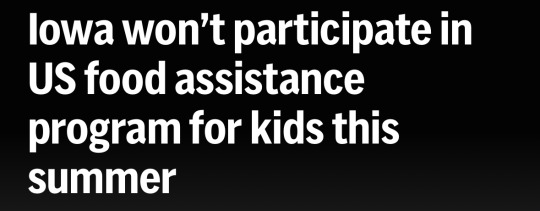
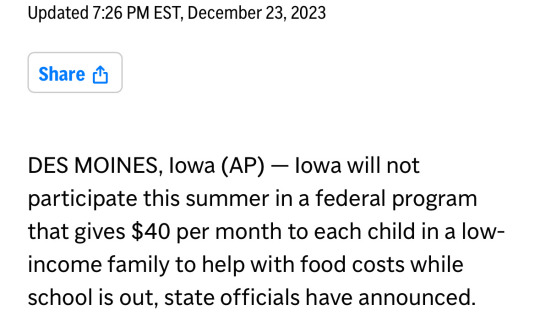
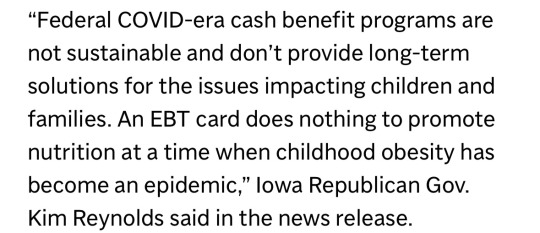
Source
“I don’t like all aspects of this federal food assistance program, so now you get no food at all” is not the based position Gov. Kim Reynolds (R) thinks it is.
507 notes
·
View notes
Text
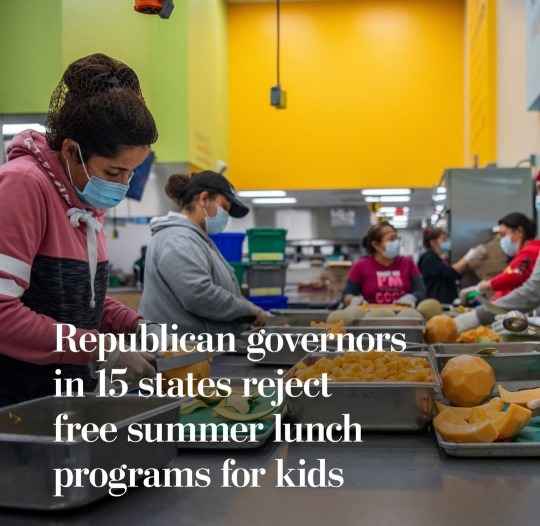
The program is expected to serve 21 million youngsters starting around June, providing $2.5 billion in relief across the country.
The governors have given varying reasons for refusing to take part. Iowa Gov. Kim Reynolds (R) said she saw no need to add money to a program that helps food-insecure youths “when childhood obesity has become an epidemic.” Nebraska Gov. Jim Pillen (R) said bluntly, “I don’t believe in welfare.”
Source
Source
Source
63 notes
·
View notes
Text
« So while other states were banning books from their schools, we were banishing hunger from ours. »
— Gov. Tim Walz of Minnesota contrasting his record as governor with those of book-banning control freak Republicans like Ron DeSantis (Florida), Greg Abbott (Texas), Spencer J. Cox (Utah), and Kim Reynolds (Iowa).
Gov. Walz made that point during his acceptance speech for the Democratic nomination for vice president.
youtube
Picking Tim Walz was Kamala Harris's first major decision in the campaign. It showed that she has more claim to being a "savvy genius" in politics than certain other people.
Watch out, Trump: Walz shows he’s not just Minnesota nice
#tim walz#minnesota#acceptance speech#chicago#democratic national convention#school meals in minnesota#book banning republicans#kamala harris#harris-walz#democrats#election 2024#vote blue no matter who
20 notes
·
View notes
Text
Robin Opsahl at Iowa Capital Dispatch, via The 19th:
Many patients seeking abortion care in Iowa in the past few weeks were unaware that the state has banned most abortions beginning Monday, Planned Parenthood staff said.
More than six years after the Legislature first attempted to pass the law, abortion became illegal in Iowa, with narrow exceptions, at 8 a.m. Monday.
Kristina Remus, a Planned Parenthood patient services associate, said Friday that many people she is working with are unaware that Iowa’s abortion law was changing.
“To say the last few weeks have been hard is an understatement,” Remus said. “People are confused and seeking clarification. And a lot of patients are unaware that there is a law banning abortion at about six weeks before many people know that they’re pregnant set to take effect so soon on Monday. We are having extremely difficult conversations in my department with patients.”
The Iowa law bans abortions after cardiac activity is detectable in an embryo, something that can occur as early as six weeks of gestation. There are some exceptions to the ban, including for rape, incest and to save the life of the mother.
The so-called “fetal heartbeat” law was blocked from enforcement shortly after it was passed in July 2023. It was signed by Gov. Kim Reynolds in a special session after the Iowa Supreme Court ruled to uphold an injunction on a similar 2018 law. But in this June, the state Supreme Court ruled that a district court judge should lift the injunction on the 2023 measure, in addition to setting a lower legal standard for testing the constitutionality of Iowa abortion laws.
Iowa’s draconian 6-week abortion ban law HF732 is now in effect, thanks to the Republican majority on the state’s Supreme Court.
#Iowa HF732#Iowa#Abortion#Abortion Bans#Iowa Supreme Court#Planned Parenthood v. Reynolds#Kim Reynolds
8 notes
·
View notes
Text
Who will Trump pick as his VP candidate? (Part 3)
Who do you think Donald Trump will pick as his running mate in 2024? This does not mean who you would prefer--just who you think is most likely.
I've divided the possibilities into 4 polls because Tumblr only allows 12 choices per poll. Here are the current and former governors. You can also vote in the other polls for senators, representatives, and non-politicians.
After these polls close, I'll post a final round consisting of the top choices.
(Nikki Haley was governor of South Carolina before she became UN ambassador.)
Tumblr does not allow political posts like this to be Blazed. So to increase participation, please reblog if US politics is a topic that you post about.
#poll#vice president#2024#original post#greg abbott#doug burgum#chris christie#ron desantis#nikki haley#henry mcmaster#kristi noem#kim reynolds#sarah huckabee sanders#glenn youngkin
9 notes
·
View notes
Text

"Women's Bill of Rights", you signed a heartbeat bill into law, you delusional cunt. There is literally "separate but equal" language in the bill. It's like the bill was designed to invite lawsuits.
I hate politicians. So very much. And women politicians are consistently the worst of the worst.
10 notes
·
View notes
Text
Iowa Gov. Kim Reynolds signed a bill into law Tuesday evening that supporters say will prevent state and local government from infringing on Iowans’ religious freedom.
Opponents of the “Religious Freedom Restoration Act” have said it opens the door to discrimination, especially against LGBTQ Iowans.
Reynolds, a Republican, signed the bill into law at a private event hosted by The Family Leader, a conservative Christian organization…
8 notes
·
View notes
Text
#wtf Iowa#abortion is healthcare#abortion is a human right#gov. kim reynolds#reminder that exceptions don't really exist for these laws#abortion ban
0 notes
Text

Kim? It's free money Kim. It pays for itself Kim.

Kim. The Bush administration looked into these kinds of programs and found that not only are they sustainable, but that they make money over time. It's a long term investment in kids not starving, Kim

Kim, we have no infrastructure because you keep dismantling it, Kim. Kim I swear to god.
I used to work in a school with a ton of food insecure students. Seeing stuff like this is heartbreaking. Remember that when you vote republican, the cruelty is the point. A few other states have refused the money. You'll never guess which ones.
#iowa#iowa news#kim reynolds#kim reynolds you dumb bitch#kim reynolds loves starving kids#196#r/196#let us have legal weed kim you dumb bitch#this bitch was addicted to alcohol so now she wont let us have legal weed#this bitch#politics
12 notes
·
View notes
Text
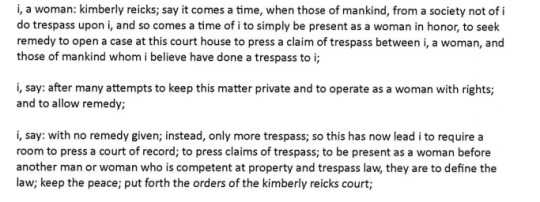

When you want $90 million over a drag show you didn’t even attend…but also want to sound like a person from a tv show set in the medieval era.
79 notes
·
View notes
Text
DES MOINES, Iowa (AP) — A bill in Iowa that would allow the state to arrest and deport some migrants is stoking anxiety among immigrant communities, leaving some to wonder: “Should I leave Iowa?”
The legislation, which is expected to be signed by Gov. Kim Reynolds, would make it a state crime for a person to be in Iowa if previously denied admission to or removed from the United States. It mirrors part of a Texas law is currently blocked i n court.
Across Iowa, Latino and immigrant community groups are organizing informational meetings and materials to try to answer people's questions. They’re also asking local and county law enforcement agencies for official statements, as well as face-to-face meetings.
As 80 people gathered in a Des Moines public library community room last week, community organizer Fabiola Schirrmeister pulled written questions out of a tin can. In Spanish, one asked: “Is it safe to call the police?” Another asked: “Can Iowa police ask me about my immigration status?” And: “What happens if I’m racially profiled?”
Erica Johnson, executive director of Iowa Migrant Movement for Justice, the organization hosting the meeting, sighed when one person asked: “Should I leave Iowa?”
“Entiendo el sentido,” she said. I understand the sentiment.
Schirrmeister, who hosts a local Spanish-language radio show, explained how long organizers have worked to build a bridge with law enforcement.
“It’s sad how it’s going to hurt the trust between local enforcement, pro-immigrant organizations and the immigrant communities," she said.
Des Moines Police Chief Dana Wingert told The Associated Press in an email that immigration status does not factor into the department's work to keep the community safe, and he said it would be “disingenuous and contradictory” to incorporate it at the same time law enforcement has been working to eliminate such bias.
“I’m not interested, nor are we equipped, funded or staffed to take on additional responsibilities that historically have never been a function of local law enforcement,” he added.
In Iowa and across the country, Republican leaders have rallied around the refrain that “every state is a border state" as they accuse President Joe Biden of neglecting his responsibilities to enforce federal immigration law. That’s led Republican governors to send troops to support Texas Gov. Greg Abbott’s Operation Lone Star, and legislatures to propose a variety of state-level strategies.
Iowa’s lawmakers advanced the measure to address what one lawmaker called a “clear and present danger” posed to Iowans by some migrants crossing the southern border. Republican Rep. Steve Holt acknowledged questions of constitutionality around the bill but ultimately argued that Iowa has “the right, the duty and the moral obligation to act to protect our citizens and our sovereignty.”
“If we end up in a court battle with the federal government, should this pass, bring it on,” Holt said during a subcommittee meeting in February. “I think it’s time for every state to stand up and say … ‘we’ve had enough. We will defend our people.’"
The Texas law is stalled in court, after a challenge from the U.S. Department of Justice, which says it conflicts with the federal government’s immigration authority. The department did not immediately comment on the Iowa bill.
The Iowa legislation, like the Texas law, could mean criminal charges for people who have outstanding deportation orders or who have previously been removed from or denied admission to the U.S. Once in custody, migrants could either agree to a judge’s order to leave the U.S. or be prosecuted.
The judge’s order must identify the transportation method for leaving the U.S. and a law enforcement officer or Iowa agency to monitor migrants' departures. Those who don’t leave could face rearrest under more serious charges.
The bill in Iowa faces the same questions of implementation and enforcement as the Texas law, since deportation is a “complicated, expensive and often dangerous” federal process, said immigration law expert Huyen Pham of Texas A&M School of Law.
“How are Iowa law enforcement agencies going to determine if someone has entered Iowa in violation of an immigration order?” Pham asked. She said questions remain about which country a detained person would be sent back to, how they would get there and how agencies would communicate with those countries.
Deportations are a binational process, she said, meaning the federal government negotiates with the governments of other countries. Disjointed immigration policy state-by-state could threaten those international relationships, Pham said.
Mexico has already said that it would reject any state or local government enforcement of immigration laws.
The Iowa State Patrol, as well as representatives of multiple police departments and county sheriff’s offices across the state, declined to comment on the bill before it is signed into law.
Shawn Ireland, president of the Iowa State Sheriff’s and Deputies Association and a deputy sheriff in Linn County, said in an email that law enforcement officials would consult with county attorneys for guidance if the bill becomes law.
But Ireland added that community-police relations are a priority, and law enforcement’s focus “is not on looking for people who came to this country illegally and are not committing crimes."
Manny Galvez, leader of the Escucha Mi Voz (Hear My Voice) community group based in the rural city of West Liberty, said the bill has galvanized immigrant communities, including some that are in harder-to-reach areas of Iowa, to send the message that immigration is a human issue and that the state’s meatpacking plants, cornfields and construction projects rely on immigrant labor.
Lawmakers advancing a bill like this one are disconnected from that reality, Galvez said.
“Criminalizing the immigrant community is not the answer,” he said. “We tell people: ‘Don’t be afraid. No tengan miedo. We are going to keep fighting this.’"
6 notes
·
View notes